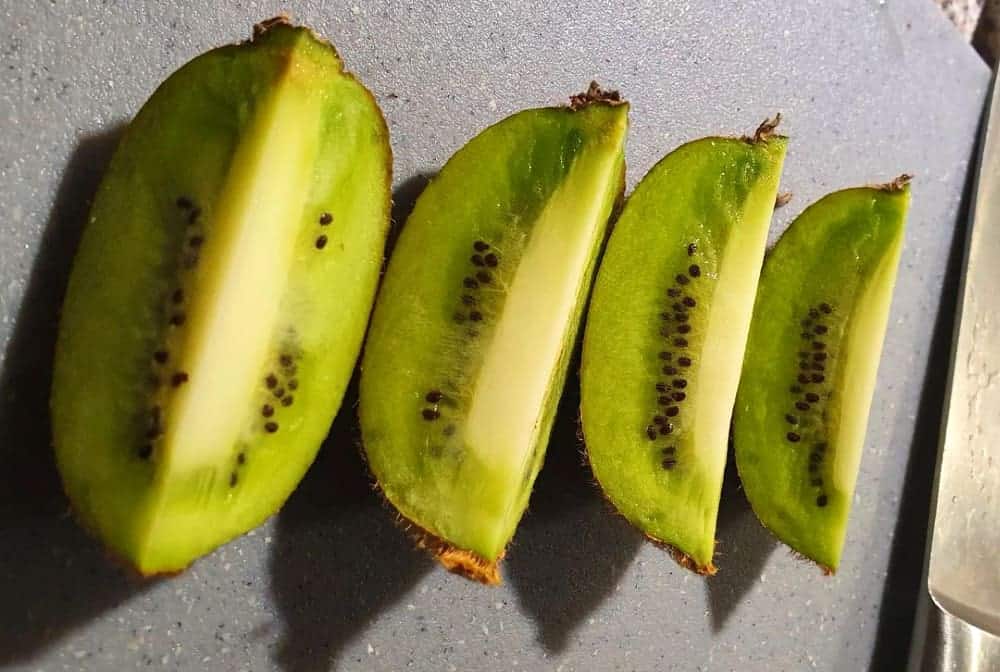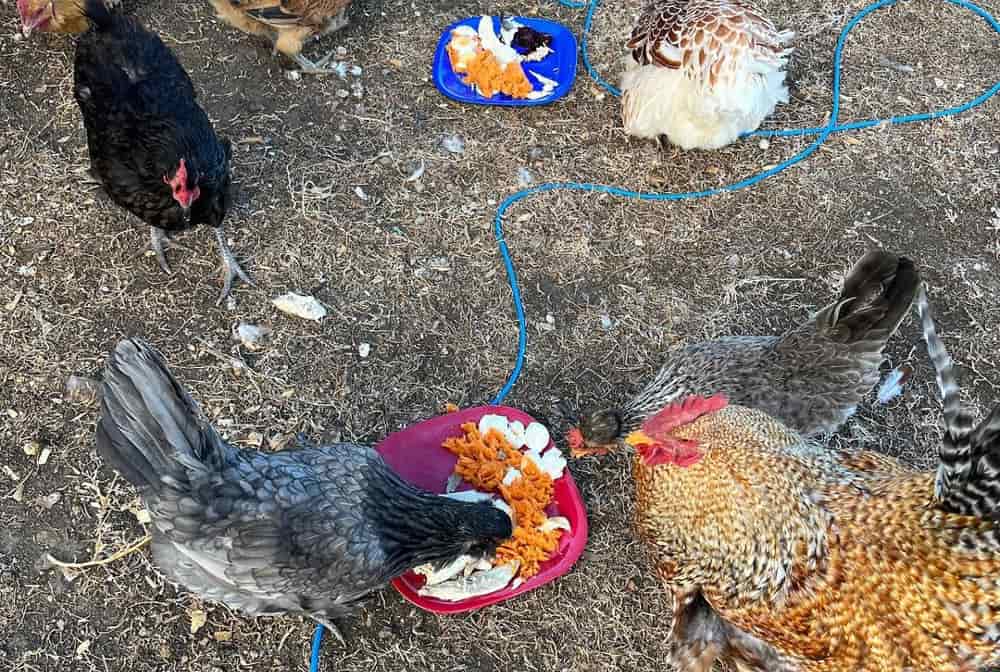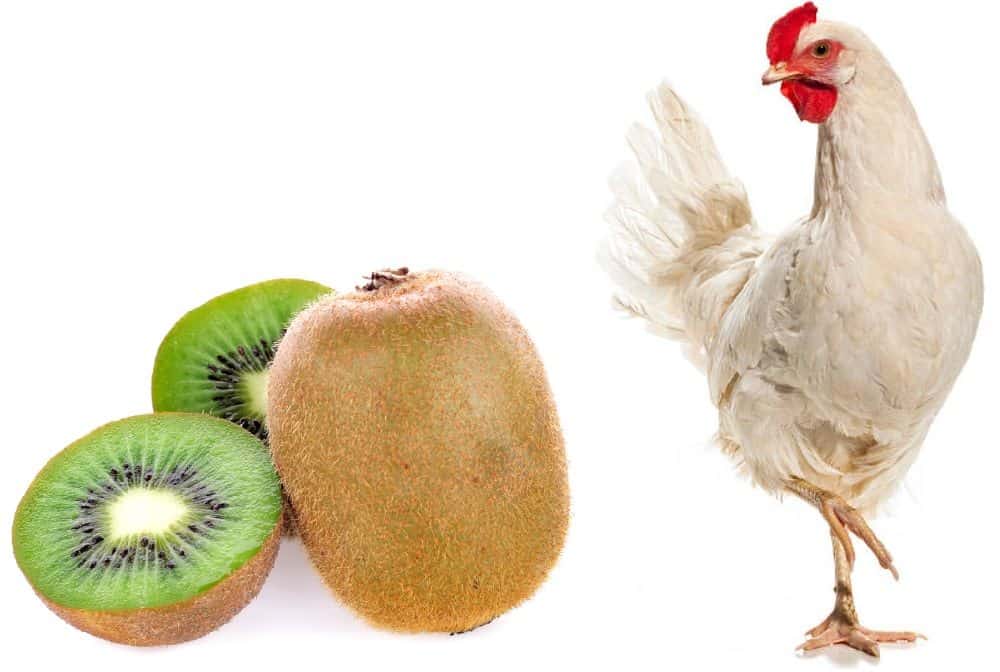In fact, chickens are exquisite foodies that eat a variety of foods, which means that they can eat both plants and meat. This natural diet helps them stay healthy and provides them with the nutrients they need to lay eggs and produce meat. While feathered can eat a variety of fruits and vegetables, there’re some that are better for them than others.
One of the best things about feeding kiwis to chickens is that they love it! Chickens are naturally curious creatures, they’ll be intrigued by this strange new fruit.
Is Kiwi Safe for Chickens?
With so many different fruits and vegetables out there, it can be hard to keep track of which ones are safe for your chickens and which ones aren’t. Kiwi is a popular fruit that many people enjoy, but is it safe for them, and can chickens eat kiwi skin?
Generally speaking, kiwi is safe for birds to eat. They can eat both the flesh and the skin of the kiwi fruit, so there’s no need to worry about peeling it first. The seeds of the kiwi are also safe for birds to eat. Too many fruits can lead to an upset stomach in feathered, so it’s best to give them only a small amount at a time. It’s also important to make sure that the fruit is ripe before feeding it to chickens. Unripe fruit can cause stomach upset in chickens.
Some people believe that kiwi is not safe for chickens to eat because of the high level of acidity in the fruit. However, birds can safely eat kiwis. Acidity in the kiwi will not harm the chicken.
Nutritional Value of Kiwi for Chickens

In addition to being safe, kiwis can actually be good for chickens. This fruit is a rich source of Vitamin C, which can help boost a bird’s immune system. Vitamin C is also an antioxidant, so it can help reduce the risk of certain diseases. Vitamin C in kiwis can help them fight off infection and fiber can help with their digestion.
Another benefit of kiwi is that it can help chickens produce more eggs. Vitamin E in kiwi can help chickens produce healthier eggs. It’s also a good source of fiber.
It’s a refreshing fruit that birds will enjoy. Kiwi is a great option for them because it’s a nutritious fruit that contains a variety of vitamins and minerals. Chickens need a balanced diet to stay healthy and kiwi provides many of the nutrients they need. Chickens that eat this treat are likely to be healthy and have fewer problems with their immune system, gastrointestinal system, and overall health.
What is the Danger of Feeding Chickens Unripe Kiwis?
While kiwi is not poisonous to feathered, there’re some dangers associated with feeding them this fruit.
Feeding birds unripe kiwi can be dangerous as the fruit contains a compound called actinidin which can cause gastrointestinal issues in chickens. They may also refuse to eat unripe kiwi due to its sour taste. The unripe fruit is high in acidity and can cause an imbalance in the chicken’s gut flora, leading to gastrointestinal distress.
How to Feed Kiwis to Chickens
Here are five serving tips to keep in mind when giving your pets kiwis. Start with a small amount. Kiwis are a new food for your birds, so it’s best to start with a small amount.
Chickens typically like to peck at different foods, so serving kiwis with other foods will help them eat them. Chop up the kiwi. Chickens typically don’t have the best teeth, so chopping up the kiwi will make it easier for them to eat. Serve the kiwis with other fruits and vegetables to create a healthy, balanced meal for your feathered.
Keep an eye on your pets when they’re eating kiwis, as they may eat too much and get sick. If this happens, reduce the amount of kiwis you give them in future meals.
FAQs on Kiwi For Chickens
Can chickens eat slightly spoiled kiwis?
While chickens are not as susceptible to food poisoning as humans are, they can still develop the condition if they eat spoiled food. Symptoms of food poisoning in chickens include lethargy, diarrhea, and vomiting. If you notice your pet exhibiting any of these symptoms, you should take them to the vet immediately.
What to do if the chicken had too many kiwis?
The best thing to do is to give it some time to digest the fruit. Too many kiwis at once can lead to an upset stomach or diarrhea. Just let the chicken rest for a bit and then offer it some water. In most cases, if your birds have eaten too many kiwis, they will recover without any problems.
How many kiwis can you give a chicken?
There’s no definitive answer to this question as it depends on a number of factors, including the size and age of the chicken, as well as its level of activity and overall health. However, as a general guide, one item per chicken per day is a good rule of thumb. If you have a larger individual, you can give them two fruits. But if you have a smaller individual, only give them half a kiwi. If you’re unsure, it’s always best to err on the side of caution and give fewer kiwis, rather than too many.
Conclusion

If you’re looking for a way to add some extra nutrition to your chicken’s diet, kiwi is a great option. Kiwis are a good source of vitamins C and E, which are important for feathered’ immune systems. Kiwis are also a good source of potassium, which’s important for chickens’ heart health. In addition, they contain antioxidants, which can help protect them from disease. Just be sure to introduce it slowly, in small amounts, and watch your chickens enjoy this delicious and healthy treat.
Sources:
- Effect of vitamin E supplementation on growth performance, meat quality, and immune response of male broiler chickens: A meta-analysis (by Mariana A.Pompeua Luigi, F.L.Cavalcantib Fabio, L.B.Toral, ScienceDirect) https://www.sciencedirect.com/science/article/pii/S1871141317303621#:~:text=Vitamin%20E%20is%20broadly%20recognized,Leshchinsky%20and%20Klasing%2C%202001)
- Kiwifruit proteins and enzymes: actinidin and other significant proteins (by Mike Boland, National Library of Medicine) https://pubmed.ncbi.nlm.nih.gov/23394982/
- Role of Antioxidants in Poultry (by Dr. Aamrapali Bhimte, Biotech Articles) https://www.biotecharticles.com/Healthcare-Article/Role-of-Antioxidants-in-Poultry-4427.html#:~:text=In%20feed%20antioxidants%20play%20a,metabolism%20on%20 various%20 metabolic%20 processes
